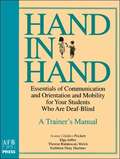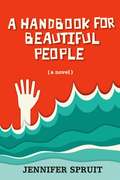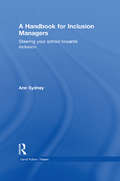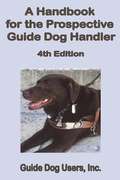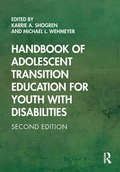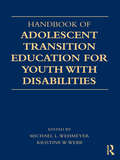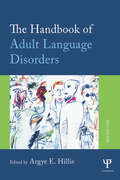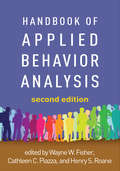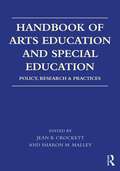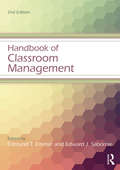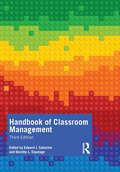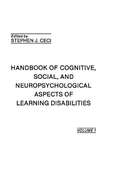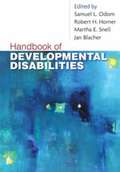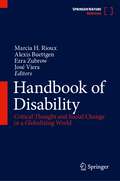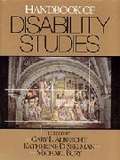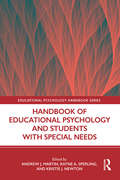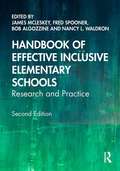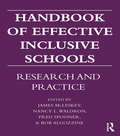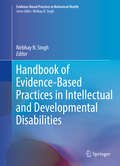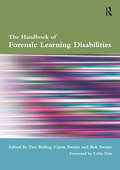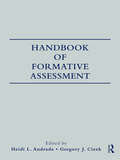- Table View
- List View
Hand in Hand: Essentials of Communication and Orientation and Mobility for Your Students Who Are Deaf-Blind: Volume I, Units 1, 2, and 3
by Kathleen Mary Huebner Jeanne Glidden Prickett Therese Rafalowski Welch Elga JoffeeThis series was designed to develop resources for educators of children who are visually impaired, hearing impaired, and severely disabled. The Hand In Hand materials emphasize the communication and mobility skills crucial to independence, and provide important information to help service providers do their jobs effectively. Containing contributions from more than 30 nationally recognized experts in the field of deaf-blindness, this groundbreaking information consists of four components that can be used separately or together. A two-volume, self-study text that explains how deaf-blind students learn, focusing on essential communication and mobility skills. Designed to provide comprehensive information in an easy-to-read way, this invaluable resource includes identified key concepts, self-study questions and answers, and references. The user-friendly format includes concise "Help at a Glance" and "From Theory to Practice" sections throughout. Sidebars, figures, tables, graphs, and photos offer additional perspectives and information.
Hand in Hand: A Trainer's Manual
by Elga Joffee Jeanne Glidden Prickett Kathleen Mary Huebner Therese Rafalowski WelchAn in-service training guide that presents structured information and guidelines for using the Hand In Hand materials with various audiences. Focusing on the needs of the trainer, this manual provides sample blueprints for individual workshops, as well as an overview of training, assessment, and evaluation. Also includes sample forms for conducting a pre-training needs assessment and post training evaluation.
Hand in Hand: Essentials of Communication and Orientation and Mobility for Your Students Who Are Deaf-Blind: Volume II Appendixes, Glossary, Resources, Index
by Elga Joffee Jeanne Glidden Prickett Therese Rafalowski Welch Kathleen Mary HuebnerThis series was designed to develop resources for educators of children who are visually impaired, hearing impaired, and severely disabled. The Hand In Hand materials emphasize the communication and mobility skills crucial to independence, and provide important information to help service providers do their jobs effectively. Containing contributions from more than 30 nationally recognized experts in the field of deaf-blindness, this groundbreaking information consists of four components that can be used separately or together. A two-volume, self-study text that explains how deaf-blind students learn, focusing on essential communication and mobility skills. Designed to provide comprehensive information in an easy-to-read way, this invaluable resource includes identified key concepts, self-study questions and answers, and references. The user-friendly format includes concise "Help at a Glance" and "From Theory to Practice" sections throughout. Sidebars, figures, tables, graphs, and photos offer additional perspectives and information.
A Hand Well Played: The Life of Jim Wheat Jr.
by Anne Hobson FreemanAn engaging and inspirational biography of Jim Wheat, a blind investment banker who built a prominent brokerage firm.
A Handbook For Beautiful People
by Jennifer SpruitMarla has a troubled past. Her rocky upbringing in a series of foster homes, complicated by the fact that she has fetal alcohol syndrome, has made it hard for her to plan her life and follow through on decisions. At last she is working consistently, and she has a relationship with a guy who seems stable and caring. Then, when Marla discovers she is pregnant, her life becomes a whirlwind of complications and uncertainties. She calls upon her brother Gavin, who is deaf, to provide moral support. Her roommate Dani, a longtime drug addict, is a help and a hindrance. And Liam, who has his own demons, is ambivalent about his impending fatherhood. There are no easy answers, but Marla manages to find the support she needs and the strength to make hard choices.
A Handbook for Inclusion Managers: Steering your School towards Inclusion (nasen spotlight)
by Ann SydneyAre you responsible for inclusion in your school? As an Inclusion Manager, you have a strategic role that covers a great deal more than special educational needs, and requires a specific knowledge and skill set in order to steer your school towards inclusion. A Handbook for Inclusion Managers presents a wide range of information, providing plenty of fresh ideas and a stimulus for reflection on your practice. This comprehensive and accessible text examines recent legislation, including the Common Assessment Framework, and provides information on how to gain accreditation for your work on inclusion. It will help you to create and manage an inclusive school, covering a wide range of knowledge and skills including: getting the best from your staff how to interpret data to judge the achievement of different groups in your school where the money for inclusion comes from what inclusive teaching and learning look like working with special schools community cohesion reporting to governors, parents and Ofsted working on an inclusion strategy. Providing a framework which can be adapted to suit individual schools, A Handbook for Inclusion Managers includes a checklist of good practice to enable you to keep track of your school’s progression. The author provides numerous references to useful organisations, websites and publications to make your life easier. This invaluable companion for Inclusion Managers, SENCos and anyone working on inclusion gathers together the background information and practical advice you need to successfully manage a truly inclusive learning environment.
Handbook for Itinerant and Resource Teachers of Blind and Visually Impaired Students
by Doris Willoughby Sharon DuffyProvides suggestions for teachers of the visually impaired
A Handbook for the Prospective Guide Dog Handler
by Guide Dog Users Inc.A handbook full of information for those considering getting a guide dog.
Handbook of Adolescent Transition Education for Youth with Disabilities
by Michael L. Wehmeyer Karrie A. ShogrenNow in a thoroughly revised and updated second edition, this handbook provides a comprehensive resource for those who facilitate the complex transitions to adulthood for adolescents with disabilities. Building on the previous edition, the text includes recent advances in the field of adolescent transition education, with a focus on innovation in assessment, intervention, and supports for the effective transition from school to adult life. The second edition reflects the changing nature of the demands of transition education and adopts a "life design" approach. This critical resource is appropriate for researchers and graduate-level instructors in special and vocational education, in-service administrators and policy makers, and transition service providers.
Handbook of Adolescent Transition Education for Youth with Disabilities
by Michael L. Wehmeyer Kristine W. WebbTransition from secondary education to adulthood represents a period during which adolescents with disabilities face multiple responsibilities and changing roles that include establishing independence, attending postsecondary education or training, developing social networks, choosing a career, participating in their communities, and managing healthcare and financial affairs. Sponsored by the Division of Career Development and Transition (DCDT) of the Council of Exceptional Children, this handbook provides a comprehensive resource to the communities of educators, related service and agency personnel, families, caretakers, counselors, and other stakeholders who facilitate these complex transitions to adulthood for adolescents with disabilities. Comprehensive – This comprehensive volume includes coverage of historical foundations, policy, transition programming and planning, development of student skills, and program structure. It also recommends transition supports for students with specific disabilities. Organizing Taxonomy – The book is organized around a well recognized taxonomy for adolescent transition used by many states to design and reform their transition services. Expertise – The volume editors are past-presidents of the Council for Exceptional Children’s Division on Career Development and are leaders in transition research and practice. Contributors are well-recognized for their expertise in transition. Chapter Structure – Each chapter includes a discussion of evidence-based research, recommended practices, suggestions for transition personnel and families, and additional resources. This book is appropriate for researchers and graduate-level instructors in special education and vocational education, inservice administrators and policy makers, and transition service providers.
The Handbook of Adult Language Disorders
by Argye E. HillisThe Handbook of Adult Language Disorders is the essential guide to the scientific and clinical tenets of aphasia study and treatment. It focuses on how language breaks down after focal brain damage, what patterns of impairment reveal about normal language, and how recovery can be optimally facilitated. It is unique in that it reviews studies from the major disciplines in which aphasia research is conducted—cognitive neuropsychology, linguistics, neurology, neuroimaging, and speech-language pathology—as they apply to each topic of language. For each language domain, there are chapters devoted to theory and models of the language task, the neural basis of the language task (focusing on recent neuroimaging studies) and clinical diagnosis and treatment of impairments in that domain. In addition, there is broad coverage of approaches to investigation and treatment from leading experts, with several authors specializing in two or more disciplines. This second edition focuses on characterizing the cognitive and neural processes that account for each variant of aphasia as a first step toward developing effective rehabilitation, given that aphasia is one of the most common and disabling consequences of stroke. The best and most authoritative handbook in the field, The Handbook of Adult Language Disorders is the definitive reference for clinicians and researchers working in the scientific investigation of aphasia.
Handbook of Applied Behavior Analysis, Second Edition
by Wayne W. Fisher, Cathleen C. Piazza and Henry S. RoaneWidely regarded as the authoritative work on the principles and practice of applied behavior analysis (ABA), this indispensable volume is now in a revised and expanded second edition. Leading experts present evidence-based procedures for supporting positive behaviors and reducing problem behaviors with children and adults in diverse contexts. Chapters delve into applications in education, autism treatment, addictions, behavioral pediatrics, and other areas. Covering everything from behavioral assessment and measurement to the design and implementation of individualized interventions, the Handbook is a complete reference and training tool for ABA practitioners and students. New to This Edition *Incorporates key advances in research, theory, and clinical practice. *Chapters on additional applications: school consultation, pediatric feeding disorders, and telehealth services. *Chapters on quantitative analysis of behavior (matching and behavioral momentum theory) and behavioral economics. *Updated discussions of professional issues, ABA certification, and technology tools.
Handbook of Arts Education and Special Education: Policy, Research, and Practices
by Jean B. Crockett Sharon M. MalleyThe Handbook of Arts Education and Special Education brings together, for the first time in a single reference volume, policy, research, and practices in special education and arts education synthesized to inform stakeholders across a broad spectrum of education. This handbook encompasses arts education for students with disabilities, from pre-K through transition to postsecondary education and careers as well as community arts education, with particular attention to conceptual foundations; research-based practices; professional standards; students’ cognitive, artistic, and social growth; career education; and future directions for research and practice in special education and arts education.
Handbook of Classroom Management: Research, Practice, And Contemporary Issues
by Edmund T. Emmer Edward J. SabornieThe field of classroom management is not a neatly organized line of inquiry, but rather consists of many disparate topics and orientations that draw from multiple disciplines. Given the complex nature of the field, this comprehensive second edition of the Handbook of Classroom Management is an invaluable resource for those interested in understanding it. This volume provides up-to-date summaries of research on the essential topics from the first edition, as well as fresh perspectives and chapters on new topics. It is the perfect tool for both graduate students and practitioners interested in a field that is fascinating but not immediately accessible without the proper guidance.
Handbook of Classroom Management
by Edward J. Sabornie Dorothy L. EspelageThe Handbook of Classroom Management, Third Edition, is an authoritative treatment of the latest science and development in the study of classroom management in schools. Evidence-based classroom management practices and programs are essential to enhancing students’ academic, behavioral, social-emotional, and motivational outcomes across grade levels. This comprehensive volume collects scholarship and cutting-edge research for graduate students and faculty of psychology, teacher education, curriculum and instruction, special education, and beyond. The book has been thoroughly revised and expanded with updated coverage of foundational topics such as effective instruction, preventative strategies, positive behavior intervention and supports, family–school relationships, legal issues, and other related topics, while also giving new attention to social justice, students on the autism spectrum, and adaptations across urban, rural, and virtual contexts.
Handbook of Cognitive, Social, and Neuropsychological Aspects of Learning Disabilities: Volume I
by Stephen J. CeciRecognized as the definitive reference in the field, this book addresses a broad range of biologically based disorders that affect children's learning and development. Leading authorities review the genetics of each disorder; its course and outcome; associated developmental, cognitive, and psychosocial challenges; and what clinicians and educators need to know about effective approaches to assessment and intervention. Coverage encompasses numerous lower-incidence neurodevelopmental disabilities as well as more frequently diagnosed learning and behavior problems with a genetic component.
Handbook of Developmental Disabilities
by Samuel L. Odom Robert H. Horner Martha E. Snell Jan BlacherIn this reprint from 2007, Odom (child development, U. of North Carolina at Chapel Hill) et al. bring together 30 chapters reviewing current knowledge about different dimensions of developmental disabilities, neuroscientific and genetic foundations, impacts on health, learning, and behavior, and educational and clinical practices. Scholars of education, human development, psychiatry, psychology, learning disabilities, and other areas, who are based in North America and the UK, discuss definition and classification issues, social policy, research methods, cultural influences, and established and new approaches to promoting communication and language abilities, academic skills, positive social interactions, vocational and independent living skills, and positive behavior support, family adaptation, and resilience with children and adults. Other topics include dual diagnosis, pharmacological and behavioral treatments, families, and international perspectives and practices. Annotation c2009 Book News, Inc., Portland, OR (booknews.com)
Handbook of Disability: Critical Thought and Social Change in a Globalizing World
by Marcia H. Rioux Alexis Buettgen Ezra Zubrow José VieraThis important reference work maps the terrain of disability across the world by providing an overview of issues, concerns and developments in the domains of society, culture, medicine, law, policy, justice, education, economics, and science and technology. It is a truly inclusive volume bringing together perspectives from researchers, activists, professionals, service providers, international development experts and policymakers based in the global North and South, and it particularly focuses on the voices of the principal stakeholders---disabled persons themselves. Working from an interdisciplinary matrix, this book reviews historical developments, contemporary practices and policies . It addresses hitherto unchartered areas in the disability discourse that will be significant in the years to come. In the modern world, the social and medical responses to disability have been separation, segregation and incarceration of disabled people. These responses are reflected in practices of special education, building of asylums, medical classifications and sheltered employment. Current thinking on disability is based on the need to overcome such segregation through the enactment of human rights and socially just programmes, policies and laws such as inclusive education, affirmative action, reasonable accommodation, and supported decision-making. This book explores:· The evolution of the concept of disability over space and time and identifies approaches to disability, debility, equality and equity;· Broad trends in research on disability across the world;· New directions in work on disability;· The emergence of a global disability movement and its etiology;· Intersections of disability with other demographic variables like gender, race, caste, and age; and· Historical and socio-economic interfaces with colonialism, globalization, and social development. Spread over14 sections and spanning more than 80 chapters, this volume is the most comprehensive, up-to-date reference work available on the subject.
Handbook of Disability Studies
by Gary L. Albrecht Katherine D. Seelman Michael BuryDrawing on the insights of disability scholars around the world and the creative advice of an international editorial board, this book engages the reader in the critical issues and debates framing disability studies and places them in an historical and cultural context. Five years in the making, this one volume summarizes the ongoing discourse ranging across continents and traditional academic disciplines.
Handbook of Educational Psychology and Students with Special Needs (Educational Psychology Handbook)
by Andrew J. Martin Rayne Sperling Kristie NewtonHandbook of Educational Psychology and Students with Special Needs provides educational and psychological researchers, practitioners, policy-makers, and graduate students with critical expertise on the factors and processes relevant to learning for students with special needs. This includes students with attention-deficit/hyperactivity disorder, other executive function difficulties, behavior and emotional disorders, autism spectrum disorder, intellectual disabilities, learning disabilities, dyslexia, language and communication difficulties, physical and sensory disabilities, and more. With the bulk of educational psychology focused on "mainstream" or "typically developing" learners, relatively little educational psychology theory, research, measurement, or practice has attended to students with "special needs." As clearly demonstrated in this book, the factors and processes studied within educational psychology—motivation and engagement, cognition and neuroscience, social-emotional development, instruction, home and school environments, and more—are vital to all learners, especially those at risk or disabled. Integrating guidance from the DSM-5 by the American Psychiatric Association and the International Classification of Diseases (ICD-10) by the World Health Organization, this book synthesizes and builds on existing interdisciplinary research to establish a comprehensive case for effective psycho-educational theory, research, and practice that address learners with special needs. Twenty-seven chapters by experts in the field are structured into three parts on diverse special needs categories, perspectives from major educational psychology theories, and constructs relevant to special needs learning, development, and knowledge building.
Handbook of Effective Inclusive Elementary Schools: Research and Practice
by James McLeskeyNow in its Second Edition, this seminal handbook offers a comprehensive exploration of how students with disabilities might be provided classrooms and schools that are both inclusive and effective. With an enhanced focus on the elementary level, this new edition provides readers with a richer, more holistic understanding of how inclusive settings operate in K-5, featuring expanded chapters on principal engagement, teacher preparation, district-level support, school-based improvement practices, and more. Fully revised and updated to reflect changes in the field, each chapter synthesizes the research, explores if and how this knowledge is currently used in schools, and addresses the implications for practice and directions for future research.
Handbook of Effective Inclusive Schools: Research and Practice
by James McLeskey Nancy L. Waldron Fred Spooner Bob AlgozzineOver the last decade, the educational context for students with disabilities has significantly changed primarily as a result of mandates contained in NCLB and IDEA. The purpose of this book is to summarize the research literature regarding how students might be provided classrooms and schools that are both inclusive and effective. Inclusive schools are defined as places where students with disabilities are valued and active participants in academic and social activities and are given supports that help them succeed. Effectiveness is addressed within the current movement toward multi-tiered systems of support and evidence-based practices that meet the demands of high-stakes accountability.
Handbook of Evidence-Based Practices in Intellectual and Developmental Disabilities
by Nirbhay N. SinghThis handbook presents a diverse range of effective treatment approaches for individuals with intellectual and developmental disabilities (IDD). Its triple focus on key concepts, treatment and training modalities, and evidence-based interventions for challenging behaviors of individuals with IDD provides a solid foundation for effective treatment strategies, theory-to-implementation issues, and the philosophical and moral aspects of care. Expert contributions advocate for changes in treating individuals with intellectual and developmental disabilities by emphasizing caregiver support as well as respecting and encouraging client autonomy, self-determination, and choice. With its quality-of-life approach, the handbook details practices that are person-centered and supportive as well as therapeutically sound. Topics featured in the handbook include: Functional and preference assessments for clinical decision making. Treatment modalities from cognitive behavioral therapy and pharmacotherapy to mindfulness, telehealth, and assistive technologies. Self-determination and choice as well as community living skills. Quality-of-life issues for individuals with IDD. Early intensive behavior interventions for autism spectrum disorder. Skills training for parents of children with IDD as well as staff training in positive behavior support. Evidence-based interventions for a wide range of challenging behaviors and issues. The Handbook of Evidence-Based Practices in Intellectual and Developmental Disabilities is a must-have resource for researchers, clinicians, scientist-practitioners, and graduate students in clinical psychology, social work, behavior therapy, and rehabilitation.
The Handbook of Forensic Learning Disabilities
by Tim Riding Caron Swann Bob SwannThis comprehensive and practical guide helps professionals and staff within hospitals change the way they collect record store and use clinical information about patients. It illustrates how clinical governance and evidence-based practice can be easily addressed by modernising clinical information practice to benefit patients and improve staff and service efficiency. As well as helping organisations define and establish improved systems this book is of continuing use for all healthcare professionals who make store and use patient records. 'High quality shared record keeping is recognised as being fundamentally important to good patient care. This book offers an excellent practical approach to addressing the changes needed in clinical record keeping to support improved patient care clinical governance better management information and the move towards electronic patient records. It brings together a strong clinical focus with the informatics principles needed to support a successful move to modern record keeping.' Yvonne Baker and Tricia Woodhead in the Foreword It will be a useful guide for clinicians and all other health professionals dealing with clinical information.
Handbook of Formative Assessment
by Heidi L. Andrade Gregory J. CizekFormative assessment has recently become a focus of renewed research as state and federal policy-makers realize that summative assessments have reached a point of diminishing returns as a tool for increasing student achievement. Consequently, supporters of large-scale testing programs are now beginning to consider the potential of formative assessments to improve student achievement. The mission of this handbook is to comprehensively profile this burgeoning field of study. Written by leading international scholars and practitioners, each chapter includes a discussion of key issues that dominate formative assessment policy and practice today, as well as those that are likely to affect research and practice in the coming years. Key features include: Comprehensive – nineteen chapters cover all aspects of formative assessment including classroom assessment, large-scale applications, technological applications, applications for special needs students, K-12 and post-secondary applications, psychometric considerations, case studies, and discussion of alternative assessment formats such as portfolios and performance assessments. Integrative – thoughtful attention is given to the integration of large-scale and classroom assessments. Practical – provides practical guidance on how to conduct formative assessments that generate credible information to guide instruction. Global – provides perspectives from leading international scholars and practitioners whose expertise spans diverse settings, student populations, and educational systems. Accessible Style – although grounded in the latest research, the book’s style and tone has been carefully crafted to make it accessible to both the textbook and professional markets. It will also be a critical reference book for researchers in teacher preparation, educational administration, and educational policy studies.

